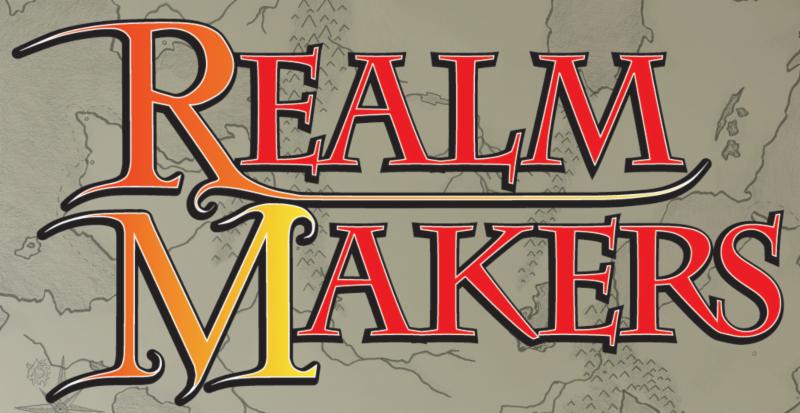The Future Of Christian Speculative Fiction
 Realm Makers, the conference for Christian speculative writers, was a huge success, by all reports. For one thing, it created a good deal of buzz about the genre, but there may have been a more important effect.
Realm Makers, the conference for Christian speculative writers, was a huge success, by all reports. For one thing, it created a good deal of buzz about the genre, but there may have been a more important effect.
First, as Christian publishing houses, small to begin with in comparison to general market publishers and the number of books they release, concentrate on the tried and true—either genre or author—the ever-expanding number of speculative authors must look elsewhere for publication.
In response to this trend, more small presses have joined the likes of Enclave and Splashdown Books, focusing primarily, if not exclusively, on speculative fiction from a Christian worldview. In addition, self-publishing as an option is no longer cost prohibitive. Finally, we can’t forget about the possibility of publishing in the general market.
In other words, Christian speculative writers have options like we’ve never had before. While some of us still feel stuck in the in between—not “Christian” enough for the Christian market and not fantastic enough or scientific enough or dark enough or violent enough for the general market—we no longer are dependent upon those two options.
But here’s were Realm Makers and any other writers’ conference come into play again. One conferee at last week’s event tweeted this: “Writing conferences: the place you go to realize you need to rewrite everything. But strangely also be inspired….” (Jesse Koepke @jessekoepke)
Conferences show writers what we can’t find out on our own—what other people think of our ideas, what professionals consider when deciding which manuscripts to publish, how our writing stacks up against the writing book buyers are paying to read. In other words, writers get schooled.
How well we learn our lessons, I believe, determines how successful we’re going to be in reaching the public with our stories in this new publishing paradigm.
As a freelance editor, I’ve seen all kinds. Some writers are so confident in their work, they don’t feel they need editing, or even revision. In contrast, some multi-piblished writers send their work through critique groups, hire an editor, and still send their work to Beta readers. In other words, they are working hard to polish their story to a shine, not according to their own standards alone, but according to the feedback they receive.
In some ways, the more a writer learns, the more he finds out what he needs to learn.
But what does all this mean for the future of Christian speculative fiction?
I think we’re right where we need to be. As atheism grows and books reflect the depravity of our society, Christian speculative fiction, like Christ Himself and those of us who follow Him, have the opportunity of presenting truth to counter the lies filling bleak books that offer no hope.
 Rather than bemoaning the state of publishing, we should pull up our socks and go to work. Yes, work! Good writing takes work, and we must not settle for mediocre. Proper marketing and promotion takes work, too.
Rather than bemoaning the state of publishing, we should pull up our socks and go to work. Yes, work! Good writing takes work, and we must not settle for mediocre. Proper marketing and promotion takes work, too.
Essentially, the future of Christian speculative fiction is in the hands of those of us who are passionate about speculative stories and more passionate about pointing to God through what we write.
It’s an exciting time. We can create quality stories, draw attention to the best of our genre, support and encourage readers in their efforts to find good books—and no gatekeepers stand in our way. The readers themselves are the gatekeepers.
We as readers can play an active role and help advance the cause of Christian speculative fiction—not by giving meaningless 5-star reviews or by voting for books in contests based on how popular the author is. We can also do the hard work of telling the truth about books—the good and the not so good.
In reality, honest feedback is the only helpful feedback. If someone buys a book because the last twenty people gave it five stars, only to discover that it has holes in the plot and weakly developed characters, not only has that author lost a reader, perhaps the whole genre has lost a reader.
We’re at a crossroads, I believe. Are Christian speculative stories going to speak to our culture, or not?
By God’s help we can use speculative fiction to show who God is and what difference He makes in the world. We can show to a world floundering without purpose why we’re here. We can show the value of life to a world devaluing humans. We can show what it means to love our neighbor or to embrace absolute truth. We can paint a picture that shows our eternal destiny, not annihilation.
There are so many ways our stories can show God’s truth to a dying world hungry to sort through the morass of false teaching flooding our schools and movies and TV programs.
We Christian speculative writers and readers may be no more numerous or powerful than Gideon’s army, but should God choose to use us for His glory, we can make a lasting impact on our culture. If we will.











































That is a very hopeful sign. I’ve been avoiding a lot of C. Spec-fic because the prose is either generic or cliche-ridden or ungrammatical. I can’t sink into a story if I keep being popped back into teacher-me, reaching for a red pencil.
“Teacher-me”. Good phrase! I often descend into this – & I worked as a librarian, not a teacher. I find so many novels to be horrendous or hysterical (depending on my mood) and I don’t mean just C. Spec-fic as you called it. Some mainstream stuff also suffers from the same problems. And it can’t all be just due to using computerized spell checking rather than proofreaders &/or trained editors!!
Your books do not suffer from this – perhaps because you are a dedicated author … or maybe because of teacher-me? ;-D
Thank you for your kind comment, but my writing always needs improvement. And yes, there is stuff out there one would assume never saw an editor. But then I’ve discovered that too many editors were business majors, and they are looking for best seller “units” and not literature. But that is a whole nothing can of annelids.
Writers like R.J. Andersen give me hope for work with a Christian underpinning or paradigm, whether or not they are overtly Christian.
The fact that you feel your writing can always improve (despite what you’ve already published – newbies, TAKE NOTE!) means that it *will* continue to improve. Am waiting for a sequel/follow-up to Banner of the Damned where I assume Vidanric, Meliara, et al will be involved.
Your comments about R.J. Anderson move her closer to the top of my ‘purchase& read’ list.
At our Christian Speculative review site, Reality Calling, Peter Younghusband and I are reviewing several books a week—many of which are very good. The genre is producing some very good stuff, from very edgy to nearly CBA-tame. It’s getting exciting.
David, that’s great to hear. Can you provide a link to the site?
By the way, you can also submit or re-submit any of those reviews here on SpecFaith.
Speculative Faith: Reviews
I think Real Makers shows that Christian speculative writers/fans can successfully carve out a niche. Hopefully, you will be able to relate our niche to other niches. I think that’s how you can speak to culture—through small connections and interconnected communities.
I’m no expert, but I guess that there’s not much hope of speaking directly to the general culture, anymore. Nothing’s really mainstream except massively popular media like the Marvel movies or the Superbowl.
Possibly true. The paradox of everyone having a louder voice on the internet–sites and indie printing and such–is that, well, now millions more voices are talking all at once. There may be fewer “gatekeepers,” but all that means is that everyone rushes the gates and gets stuck. Meaning: fewer get through. So ultimately there’s little change in the overall dominance of certain culture voices from the pre-internet years.
I saw this link the other day and went: YES! That’s one of the things that people need to get through their heads, both as writers and readers (and musicians and artists and dancers….) Quality, quality, quality.
Fiction, in one sense, is the same as debating–if the statement is poorly made (even if you agree with the point attempted), it easily backfires and weakens its own position. There’ve been books I read where I’m like oh, no, not that point now, because it tastes wrong, even to someone who agrees with it.
I guess what I’m saying is what angle are we taking here? Writers or readers?
Readers first, I would hope. 🙂
Writers can talk about writing and write about writing to other writers until the cows come home, but it won’t make a lot of difference if readers don’t care.
I understand and agree, but I think the philosophical basis for Christian speculative fiction that is often used here prevents you from being able to tell fans that they shouldn’t try to be creators. (And we all know that geeks like making stuff, I think.)
The creation mandate, imago dei, the universal human love of epic drama — I think epic stories are things that shouldn’t only be celebrated, but also participated in. Because everyone is a sub-creator.
Could you clarify this point? It sounds like you think all speculative fans should have the freedom to be creators, but don’t think this article agrees with that.
Well fans will make (art/fiction/songs/videos) regardless of injunctions or qualify control. That’s pretty much Tumblr in a nutshell. Tolkien, specifically, has a lot to say about subcreation, ranging from his letters to Leaf by Niggle and the making of the Dwarves in the Silmarillion…
I would certainly not discourage fan creativity in any way.
In fact, I think it’s clear that fans of fantastical stories (or members of fandoms in general) tend to be more-creative. They will not simply passively receive the stories made by others, but actively participate in “subcreating” in those same “official” universes by offering fanfiction, art and crossovers.
The only reason I often say, “writers, we’re fans first” is to broaden the appeal and discussion about Christian fantastical fiction as much as possible. That’s an intentional (yet I hope gentle) challenge to the many blogs and platforms I see that seem to be speaking only to producers, or aspiring producers, of these stories. That approach won’t work to help their influence grow — and in fact ultimately defeats its own purpose to help authors.
Ah. Thanks for clarification.
I don’t think the future is much brighter.
Realm Makers…eh. I’m sure it was great fun, but the problems with the genre were not solved or barely addressed, and new ones are developing. I think the largest new problem is the split between targeting Christians and trying to get published in the secular market, with a lot of people exaggerating the Christian-friendliness of the latter.
There’s still no unified fan base, the genre is still very much dependent on indies and a couple of small presses, the inferiority complex is still there, most writing is still YA level, etc.
Positives are the genre is getting more realistic, although still limited in subject matter. Some authors are also beating the “release and be released” thing-you know, releasing a single book and then disappearing.
I still think the big problem is a lack of people with money or influence backing the genre. Writers and grassroots fans can only do so much; beyond a certain point you need big publishers or people willing to take the risk to help promote and distribute books.
dmdutcher: “…most writing is still YA level, etc…”. As a retired public librarian who spent many years helping children/young adults/their parents find books the kids would want to read – I find this comment almost insulting. Kids can be discerning in their reading & writing a story that is interesting and encourages them to become life-long readers is quite a feat. At least one commenter on this thread has accomplished that and published adult novels too. So it is an accomplishment well worth striving for. UNLESS you meant that the Writing Quality is that of an (untrained) young adult; in that case I would tend to agree with you. (Oops, sorry! I see that the italics stayed on after ‘want to read’ and I can’t get it turned off on this tablet! I definitely did not mean to put that much emphasis on my comments.)
I agree that there are good ya books, but the majority of them are romance heavy or overly focused on age specific problems.
I mean too many novels read like Twilight and not Dune. Quality of writing and choice of plot. I think it’s visible more in the kind of dystopian novels we have. Many Christian dystopian works tend to not do much in the way of social commentary or deep plot, but are inspired more by hunger games style melodrama. These are okay to a point, but when the entire genre seems more an extension of YA than its own adult genre, there are issues.
(I wonder if this is due to most Christian SF traditionally being accepted in the YA market. I know in my local bookstore you only find it in kids section)